Sometimes, a little distance can be healthy. While folding up and rolling away your dog or partner may not be morally acceptable, the best exercise bikes don’t have feelings. After working up a sweat in a virtual studio class or just pedaling while you catch up on Love is Blind, the best portable exercise bikes easily drift away out of sight without consequence.
With lightweight frames, transport wheels, and upright folding, our favorite portable exercise bikes are designed to save you some space after you finish your workout. After years of pumping the pedals on more than 20 exercise bikes in our home gyms and studio apartments, we’re confident in our ability to spot a quality portable bike. Check out our top picks for exercise bikes that, after adding wonderful and terrific value to your life, can politely buzz off.
The 9 Best Portable Exercise Bikes of 2026
- Best Overall Portable Exercise Bike: NordicTrack S22i
- Best Lightweight Portable Exercise Bike: Concept2 BikeErg
- Best Budget Portable Exercise Bike: ProForm Carbon CX
- Best Adjustable Portable Exercise Bike: Schwinn IC4
- Best Foldable Portable Exercise Bike: Marcy Foldable Upright Exercise Bike
- Best Compact Portable Exercise Bike: Yosuda Indoor Cycling Bike
- Best Portable Exercise Bike for Small Spaces: Sharper Image Space Saving Stationary Bike
- Best Portable Mini Exercise Bike: DeskCycle 2
- Best Portable Exercise Bike for Seniors: Exerpeutic 400XL Folding Recumbent Bike
How We Tested and Chose the Best Portable Exercise Bikes
The BarBend team is loaded with cyclists, certified personal trainers, CrossFit professionals, and fitness enthusiasts. We’ve never met an exercise bike we didn’t want to clip into, and after completing countless workouts on over 20 bikes, we donned our expert-colored glasses to bring you the perspectives of some real cardio fiends.
Throughout our testing, we kept in mind how easy or difficult each bike would be to relocate. Across the 13 categories in our methodology, we assigned ratings of 1 (lowest) to 5 (highest) for aspects like footprint and portability, adjustability, and tech capabilities, among others. In addition to the actual bikes, we worked hard to bring our experience to life to give you a feel for what it’s like to take the best cardio machines for a spin. Here are a few of the main factors that drove our decisions.
Footprint and Portability
Our biggest consideration was — unsurprisingly — the amount of space these bikes take up, as well as how easily they can be moved. In the specs for each machine, we included the exact dimensions so you can grab your measuring tape and map out the exact spot your bike needs to go. If your exercise bike is going to be living the nomadic lifestyle, it’s important that it will be (relatively) lightweight, so also check the weight of each machine to get a sense of whether you could comfortably tilt and roll it across a room or down a hallway.
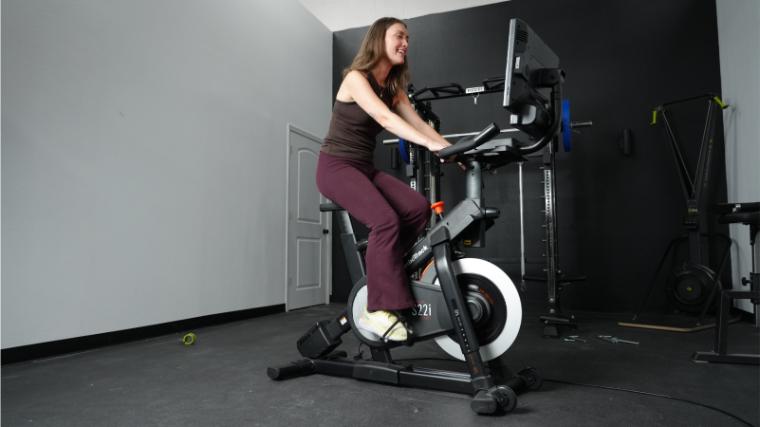
Most of our picks measure roughly 20 to 22 inches wide, but range from 61 inches in length down to just 10.24 inches in our smallest option. Just as we did, identify the size and weight of the exercise bike that matches your fitness goals to ensure it works in your space.
Price
The bikes on our list come at a wide range of prices — $189 to $1,999 — because we wanted to accommodate as many budgets as possible. Whether you’re counting your exercise bike as your next five Christmas presents, or you just need something to pedal while sitting at your desk, one of these bikes should suit your purposes.
[Related: The 12 Best Budget Home Gym Equipment]
Bikes closer to the upper end of the range may include more technology, heavier-duty builds, or larger footprints. As you approach the $189 mark, you’ll notice fewer conveniences, as well as less tech, but these options tend to be smaller and lighter, which could be a deciding factor for you.
Adjustability
Between the seat height and depth, handlebar placement, and levels of resistance, the exercise bikes on our list can suit the needs of athletes of various body types and fitness levels. Beyond finding your perfect fit, though, the adjustability on your machine may indicate just how portable it is. Options with four-way adjustable seats and handlebars may include a bit more hardware, which may affect the overall weight.
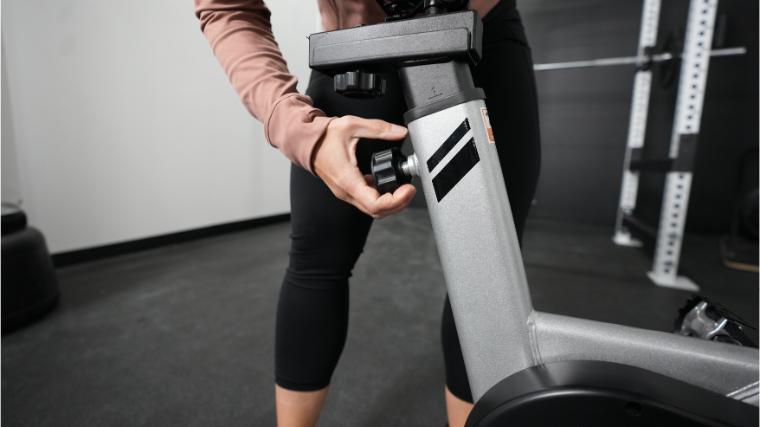
Another factor influencing the weight is the flywheel. Heavier flywheels create more momentum, which generally equate to smoother operation, but the heavier the flywheel, the heavier the bike — thank you, first-grade math.
Best Overall Portable Exercise Bike: NordicTrack S22i
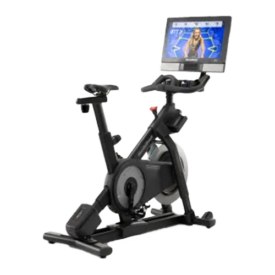
The NordicTrack Commercial S22i is high-tech and high quality, featuring both advancements like a 22” touchscreen display, and solid specs like 24 levels of quiet magnetic resistance.
Specs
- Price: $1,999
- Dimensions: 58″ H x 61″ L x 22″ W
- Weight: 205lbs
- Resistance: 24 levels of magnetic resistance
- Weight Capacity: 350lbs
Pros
- It has a stable steel frame, iFIT integration, and a -10- to 20-percent incline and decline range.
- The 22-inch HD touchscreen works to provide an immersive, studio-quality experience during iFIT classes.
- It has 24 levels of quiet magnetic resistance.
Cons
- We believe iFIT — an additional $39.99 per month — is integral to bringing out this bike’s full potential.
- At 205 pounds, it’s on the heavier end of portable machines.
As our pick for the best overall portable exercise bike, the NordicTrack S22i checks a lot of boxes — heavy-duty steel frame, 24 levels of quiet magnetic resistance, and the technology to create a studio-quality virtual experience. It earned at least a 4.5 out of 5 in nine of 13 categories during our testing, including perfect 5-out-of-5 scores for its tech capabilities, customizations, and dynamic programming, which comes courtesy of its iFIT integration.
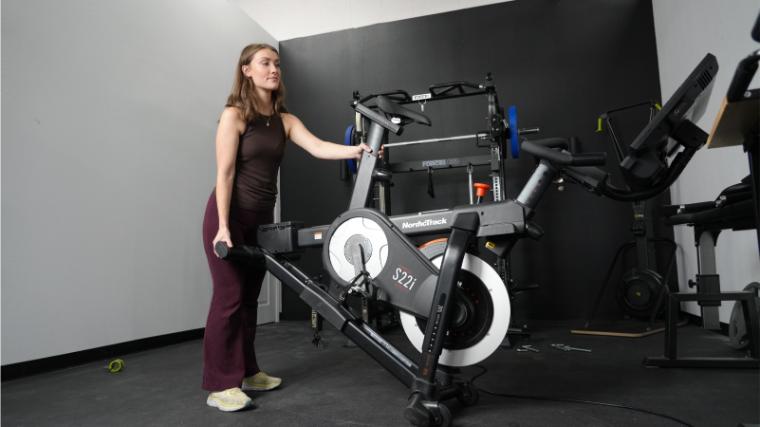
On the swiveling 22-inch HD touchscreen, you can follow over 16,000 live and on-demand iFIT classes, including — of course — indoor and outdoor cycling, strength training, yoga, Pilates, and more. The display and the iFIT experience caught the attention of Kate Meier, certified personal trainer and BarBend editorial member. “The tech built into the S22i kind of blew me away,” she said. “I think ‘immersive’ is the best word. My scenic rides through Hawaii were absolutely stunning.”
While it will cost a monthly subscription of $39.99, Meier and Jake Herod — BarBend’s expert product tester and certified nutrition coach — both feel it’s worth the extra cash. “You don’t have to purchase iFIT, but I personally think that’s how this was meant to be used,” Herod explains in his video, which you can watch below. .
As far as its footprint and portability, with all the technology and customizations on board — like 24 levels of magnetic resistance and incline and decline capabilities — Meier rated the S22i just 3.5 out of 5. “Even with the front wheels, 205 pounds may be a lot for some people to move by themselves,” she explained. “When I was moving it, I also noticed the screen could kind of throw off the balance.”
Despite its heavy build and footprint of 9.32 square feet, some may find it just portable enough for their space. The S22i occupies slightly less space than other high-end bikes with large displays that we have ridden. Both the Peloton Bike+ and Echelon Connect EX-8s are a bit wider and require 9.42 square feet of floor space.
Read our full NordicTrack S22i Exercise Bike Review.
Best Lightweight Portable Exercise Bike: Concept2 BikeErg
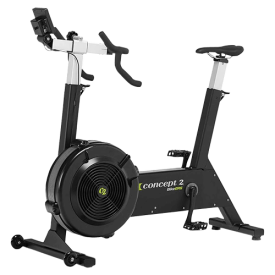
The lightweight Concept2 BikeErg eschews the moveable arms you'll find on most air bikes, delivering a power-driven ride that operates more like a standard cycle than a spin bike. The flywheel's unique damper allows riders to adjust airflow, which is akin to switching gears on a mountain bike.
Specs
- Price: $1,467
- Dimensions: 41” H x 48” L x 21” W
- Weight: 68lbs
- Resistance: Air
- Weight Capacity: 350lbs
Pros
- Its 68-pound overall weight is between 42 and 62 pounds lighter than the average exercise bike, which is around 110 to 130 pounds.
- The adjustable seat and handlebars make it easy to quickly find your fit.
- With Bluetooth and ANT+ wireless connectivity, you can connect third-party heart rate monitors to track workout data.
- You can switch out the included set of pedals with any compatible options.
Cons
- If you plan on streaming workouts or entertainment, you’ll need to use the smartphone cradle above the LCD display.
- As opposed to other air bikes, the arms are stationary.
Air bikes, with their massive flywheels and moving handlebars, aren’t the most portable cardio machines, but the BikeErg isn’t like other air bikes. It swaps out moving handlebars for fixed ones, and its flywheel — which has a damper system that works to emulate the gears of a mountain bike — is less unwieldy than what you’ll find on something like the Rogue Echo. This allows it to be more compact than other air bikes, and, at 68 pounds, roughly 42 to 62 pounds lighter than many exercise bikes.
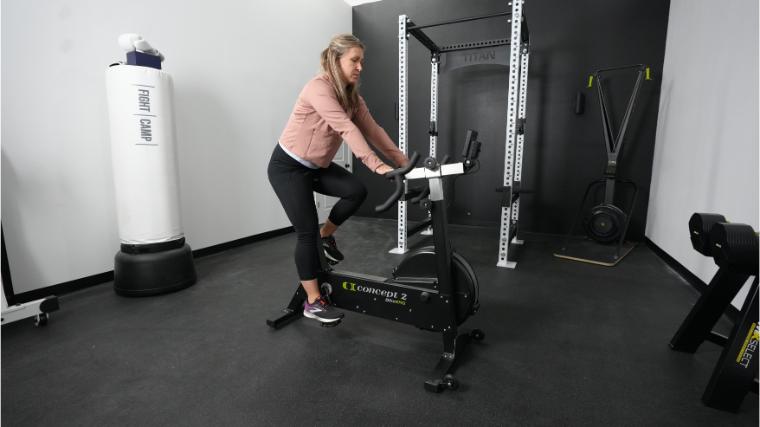
The front wheels should allow most users to tilt and roll it without assistance. And without huge handlebars or a bulky screen above the handlebars, balancing the bike while moving is much easier. Citing its 7-square-foot footprint, our tester scored the footprint and portability category a 4.5 out of 5. “I think it would fit in most home gyms or even apartments without much issue,” they noted.
[Related: Best Air Bikes]
The customizations earned a 4 out of 5 from our tester, as adjusting the seat and handlebars allowed them to find a comfortable fit. “All I had to do was flip a lever and pull the seat up, so finding the right spot was pretty easy,” they pointed out. “I could also move the handlebars up and down, as well as forward and backward.” If you’re loyal to a particular brand of pedals, the ones on the BikeErg can be switched out for clipless options or other compatible units.
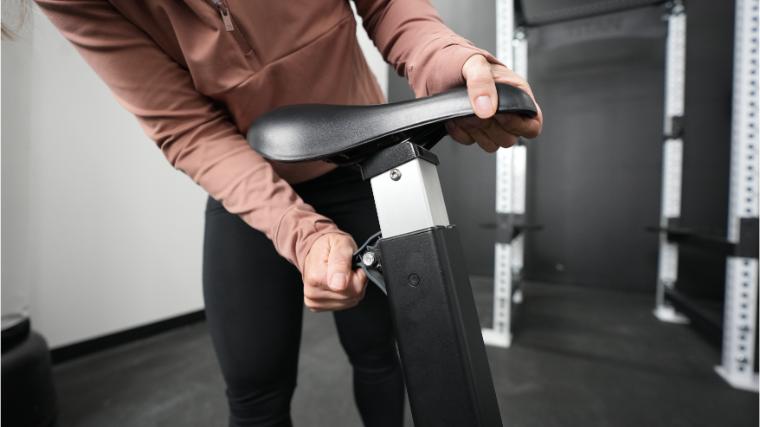
The LCD screen is about all the tech there is on this bike, but our tester took advantage of the ANT+ and Bluetooth connectivity to connect their fitness tracker and heart rate monitor. Its tech capabilities earned a rating of 3 out of 5, but again, replacing a screen with a smartphone cradle is part of what makes this bike so portable.
Best Budget Portable Exercise Bike: ProForm Carbon CX
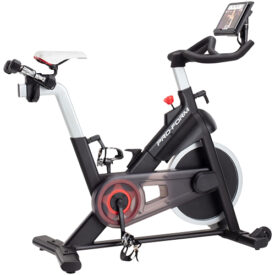
The ProForm Carbon CX is a sturdy steel 125-pound build with 16 levels of silent magnetic resistance. In addition to being one of the quietest options on the market, this bike also comes with a free year of iFit and a swiveling tablet holder, so you can stream classes on and off the bike.
Specs
- Price: $399
- Dimensions: 51″ H x 52.5″ L x 21.9″ W
- Weight: 125lbs
- Resistance: 16 levels of magnetic resistance
- Weight Capacity: 250lbs
Pros
- The Carbon CX is up to $450 less expensive than other bikes featuring 16 levels of magnetic resistance and iFIT compatibility.
- Even at 125 pounds, I was able to use the wheels to move it around with just one hand.
- The swiveling device holder allows you to stream workouts on and off your bike.
Cons
- You’ll have to stream iFIT workouts on your own device, as this bike only has an LCD display showing basic metrics.
- It lacks conveniences like fans, heart rate sensors, and speakers.
The $399 ProForm Carbon CX is our pick for the best budget portable exercise bike because it’s up to $450 less expensive than other bikes that feature 16 levels of magnetic resistance and compatibility with the iFIT fitness app. Sure, you’ll need to link up your own device to access the app’s bounty of classes, but we still think it’s a quality option for those on a limited budget. When I tested the Carbon CX, I scored its portability, customizations, durability, and ergonomics all at least a 4.5 out of 5.
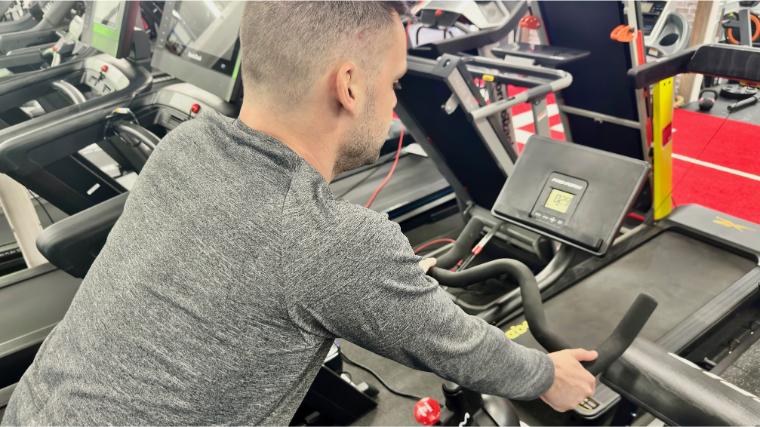
During testing, I had no issues tilting or rolling the Carbon CX on gym flooring. At 125 pounds, I was expecting a more difficult time, but once I got it upright, I was comfortably driving it with one hand. Its 8-square-foot footprint is close to average for upright bikes, so after seeing how easy it was to move, I scored its overall footprint and portability 4.5 out of 5.
An area where the Carbon CX may be lacking is its onboard technology, as its LCD display can only display basic metrics. It’s worth noting, though, that the bike’s iFIT compatibility means it can make automatic adjustments to your speed and incline based on the specifications of iFIT classes.
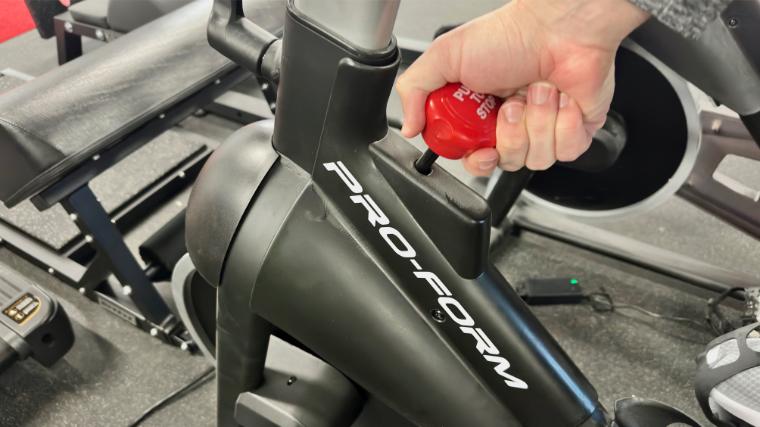
I also rated the Carbon CX’s ergonomics 4.5 out of 5, because in addition to the seat being adjustable up, down, forward, and backward, you can also swap it out for a more comfortable option.
I used the vertical grips the most, but you can also grab the triangle in the center, as well. My feet felt secure in the adjustable cages on the pedals, but these can also be switched out if you have a preferred style of pedals.
Read our full ProForm Carbon CX Exercise Bike Review.
Best Adjustable Portable Exercise Bike: Schwinn IC4
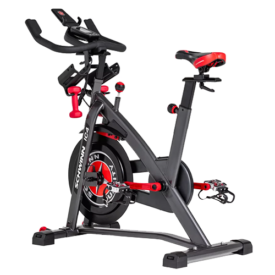
The Schwinn IC4 combines upper and lower body work with its included set of dumbbells and 100 levels of cycling resistance for a complete upper and lower body burn. Dial up your favorite streaming app and hop on, this bike is compatible with JRNY, Peloton, and Zwift.
Specs
- Price: $999
- Dimensions: 51.8″ H x 54.6″ L x 30.7″ W
- Weight: 112lbs
- Resistance: 100 levels of magnetic resistance
- Weight Capacity: 330lbs
Pros
- The 40-pound flywheel supports 100 levels of quiet magnetic resistance.
- With a four-way adjustable seat and handlebars, finding the perfect fit is a breeze.
- Track your workout data by connecting some of the best fitness apps, like Peloton or Zwift.
Cons
- Without a lot of technology built-in, $999 may be expensive for some.
- The 3-inch LCD display may be too small for some users.
The Schwinn IC4, with its adjustable seat and handlebars and 100 levels of magnetic resistance, is our pick for the best adjustable portable exercise bike. Naturally, its adjustability earned a rating of 5 out of 5, but four other categories — including customizations and durability — also earned perfect scores.
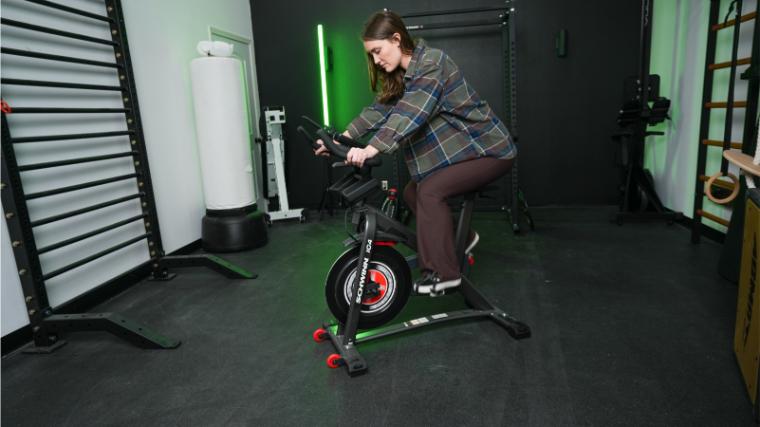
Certified personal trainer and BarBend editorial member Kate Meier completed multiple workouts on the IC4, moving it around in between rides to get a sense of its portability. “It wasn’t the lightest bike I’ve used, but the wheels definitely made it easy to move,” she explained, rating its footprint and portability 4 out of 5. “It’s just over 100 pounds, so I guess some people may need a little help moving it.” The 7.17 square feet it takes up is roughly the same as the average exercise bike, so while it’s not the most compact bike we’ve tested, it’s certainly not bulky.
Its steel frame prompted a rating of 5 out of 5 for durability from Meier. “For being so lightweight, I was totally expecting some wobbling, but it was solid as a rock,” she said. While most bikes top out at 24 or 30 levels of resistance, the 40-pound flywheel on the IC4 provides 100 levels of magnetic resistance, putting it on par with the Peloton Bike.
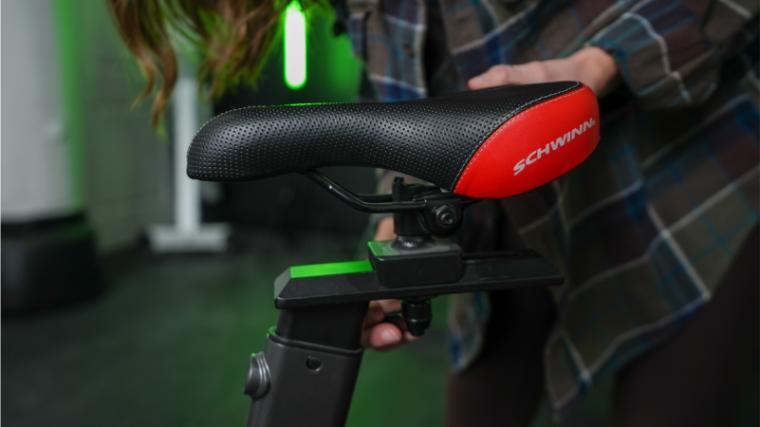
While the LCD display can display your workout metrics in real time, there is no built-in screen. However, you can sync your own device using popular apps like Peloton, JRNY, or Zwift to follow workouts and keep track of your stats and workout history. Meier thought that, overall, the IC4 was an incredible value, also rating that category 5 out of 5. “For about half the cost, I thought the ride was as smooth as any high-end option, so I think you get a ton for the price.”
Read our full Schwinn IC4 Exercise Bike Review.
Best Foldable Portable Exercise Bike: Marcy Foldable Upright Exercise Bike
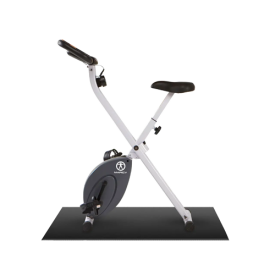
An affordable exercise bike that can fold up for easy storage. With vertical seat adjustments for an inseam between 28" and 33", the recommended height of users ranges from 5'1 to 6'3".
Specs
- Price: $189
- Dimensions: 44” H x 34” L x 19” W
- Weight: 37lbs
- Resistance: 8 levels of magnetic resistance
- Weight Capacity: 250lbs
Pros
- The removable pin allows for simple upright folding to assist with storage.
- At just 37 pounds, this lightweight bike also includes built-in transport wheels.
- The adjustable seat can allow most users to find a comfortable position, no matter their height.
Cons
- Outside of the LCD display, there are no technology features like heart rate sensors.
- It has no device holder or storage for water bottles.
In addition to being the best foldable portable exercise bike on this list, the Marcy Foldable Upright Exercise Bike is one of the best folding exercise bikes we’ve used. It features a time-tested, classic, simple, elegant, intuitive folding mechanism: a metal pin. Just slide the pin out, fold it up, and slide it back in. Voilà.
Once it’s folded up, the wheels can make moving this 37-pound bike feel effortless for most users and our tester, a CrossFit Level 1 trainer, rated five categories a 4 out of 5 or higher — including its footprint and portability.
With 14-gauge steel tubing and a 250-pound weight capacity, our tester noted the high-quality build when they tried it out, rating its durability 5 out of 5. “For $189, I was shocked at the quality,” they said. “My rides were steady and smooth and I didn’t even notice any wobbling.”
Another area this foldable wonder shines is in its customizations, which scored a 4 out of 5 from our tester. The seat is adjustable within a 4-inch range and the company claims riders between 5 feet 1 inch and 6 feet 3 inches should be able to use it comfortably. Our tester, however, estimated that that range more realistically tops out around 6 feet.
Once you find the right height, you can rotate the knob just above the pedals to switch between its 8 levels of magnetic resistance. Another adjustable feature is the foot strap on the pedals, which our tester recommended using. “I wouldn’t call the pedals ‘secure,’ so strapping in is probably the way to go,” they pointed out.
The folding design doesn’t lend itself to conveniences like water bottle holders or even a small device holder, but it does feature an LCD display so you can keep track of your metrics.
Best Compact Portable Exercise Bike: Yosuda Indoor Cycling Bike
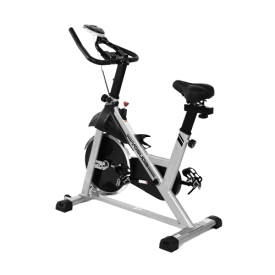
Smooth and quiet cycling with a 35 lb flywheel and attached transport wheels so you can cruise where you want to. Simple LCD screen with a lip for an iPad, tablet, or phone.
Specs
- Price: $279
- Dimensions: 45” H x 40” L x 22” W
- Weight: 68lbs
- Resistance: Magnetic
- Weight Capacity: 270lbs
Pros
- It has a footprint of just 6.11 square feet — up to 2 square feet less than other portable bikes we tested — making it ideal for small spaces.
- The belt drive system provides a smooth ride.
- At $279, it features multiple levels of magnetic resistance, which is rare at this price point.
Cons
- Our tester noticed the seat began to show wear after several uses.
- With no screen built in, you’ll need to supply your own device to stream workouts or entertainment.
- The resistance levels are not labeled.
The best compact portable exercise we’ve taken for a spin is the Yosuda Indoor Cycling Bike. At just 6.11 square feet, it can save you up to 2 square feet of floor space when compared to other portable exercise bikes we tested. It earned at least a 4 out of 5 in three categories — including footprint and portability — from our tester, a certified personal trainer and nutrition coach.
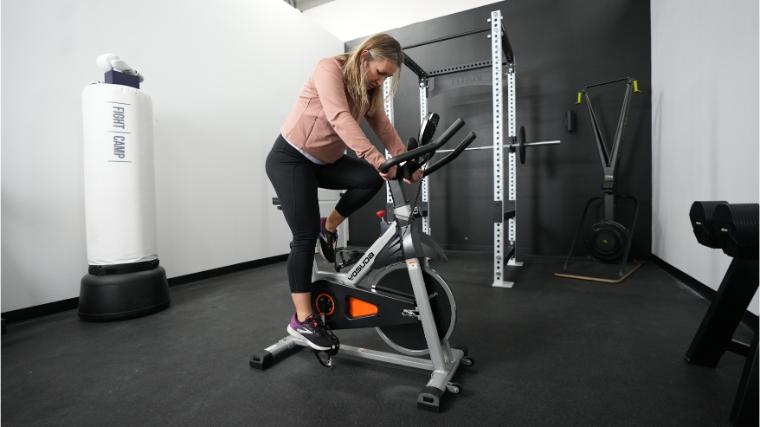
Its design doesn’t lend itself to a huge HD touchscreen or hefty flywheel, but as far as compact exercise equipment goes, it’s a cost-effective bike that our tester thought would be a solid cardio machine for beginners. “For less than $300, it definitely is a good value. I wouldn’t say it’s a ‘forever bike,’ but even if you had to replace it in a couple years, I’d still recommend it,” they said, rating its value 3.5 out of 5.
[Related: The 9 Best Exercise Bikes For Heavy People]
As our tester pointed out, this bike may not be best suited for Tour de France-level action. After just a couple rides, they started to see some evidence of that. “It only took a few rides to see some cracks along the seat, which is not a performance thing, but speaks to the overall durability,” they explained.
Its durability earned just a 2.5 out of 5, and they also noted the housing on the LCD display. “The display itself was fine — speed, time, distance — but the plastic that supports it looks like it could go at any moment.”
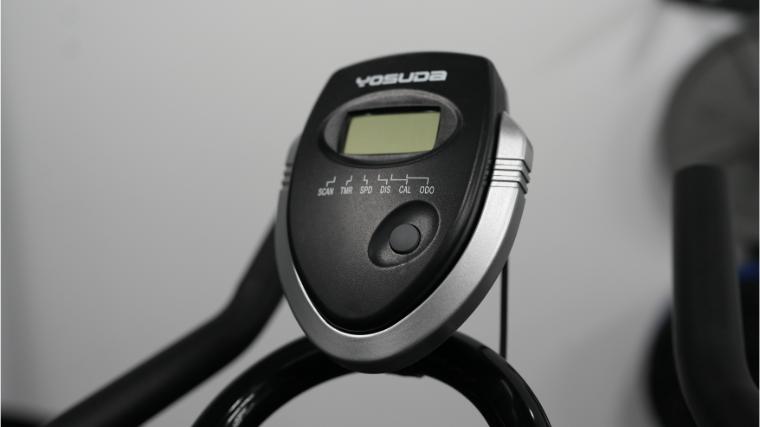
In the context of an average exercise bike — around $600 to $2,000 — the Yosuda Indoor Cycling Bike is a bargain at $279 on Amazon. For the price, we think apartment dwellers looking to do cardio workouts at home will find value in this model.
Best Portable Exercise Bike for Small Spaces: Sharper Image Space-Saving Stationary Bike
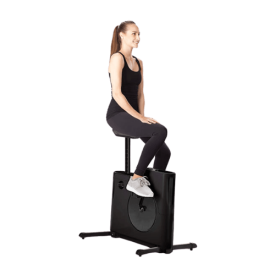
This super compact exercise bike folds up into a tiny square that you can store away under desks, under beds, or in the closet. With wheels for easy transportation, and at under 50 lbs, you can move this bike wherever you want it to go.
Specs
- Price: $349
- Dimensions: 35″ H x 27.5″ L x 22” W
- Weight: 45lbs
- Resistance: 8 levels
- Weight Capacity: 250lbs
Pros
- It occupies around half the floor space of the average exercise bike, making it ideal for small spaces.
- Despite its small size, it is adjustable for users between 5 feet and 6 feet 4 inches.
- The bike arrives mostly assembled.
Cons
- Compared to the average range for folding bikes — roughly $180 to $200 — this bike is almost double the price.
- Without handlebars or back support, it may be difficult for some to balance on the seat.
- There is no display or other tech capabilities.
At just 27.5 inches long and 22 inches wide, the Sharper Image Space Saving Stationary Bike is the best portable exercise bike for small spaces we’ve gotten our hands and feet on. Its footprint of 4.20 square feet is roughly half of the average for most exercise bikes — around 7 to 9 square feet. It unsurprisingly earned a 5 out of 5 from our tester, a CrossFit Level 1 trainer, for its footprint and portability.
In its folded position, it measures just 7 inches wide, 23 inches tall, and 25.5 inches long, so it could easily be stored under a couch or bed. That compact design also helped it earn a 5 out of 5 from our tester for delivery and setup. “It’s only 45 pounds, so I just carried it right up the stairs myself,” they said. Even with such a small profile, it does have built-in transport wheels to roll it around your small space.
While its space-saving design was a big plus, our tester was less optimistic about its actual function. “I’d probably only use this bike on hardwood floors because I think it would be pretty shaky on carpet,” they noted.
Without a screen, backrest, or handlebars, it does force you to engage your core more than a typical exercise bike. However, it earned just a 3 out of 5 for durability because of our tester’s fear of toppling over. “It honestly feels like riding a unicycle,” they said.
We think this bike is best suited for super tight spaces like dorm rooms or studio apartments, but it could also be used under a standing desk if you have the space. Our tester gave it a 3.5 out of 5 for value because compared to the average folding bike — roughly $180 to $200 — $349 is a bit steep for a bike that lacks just about everything except pedals. “Someone very tight on space would probably appreciate being able to fit an exercise bike in that space at all, so I can see it working for those people,” our tester pointed out.
Best Portable Mini Exercise Bike: DeskCycle Under Desk Bike
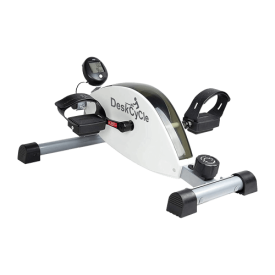
The DeskCycle Under Desk Bike was designed to help you stay active while firing off emails at work. The low-profile pedals are adjustable and compatible with desks as low as 27 inches. Its magnetic resistance, meanwhile, works to provide a whisper-quiet pedal that won't distract coworkers.
Specs
- Price: $199
- Dimensions: 10’’ H x 10.24’’ L x 24.02’’ W
- Weight: 23lbs
- Resistance: 8 levels of magnetic resistance
- Weight Capacity: N/A
Pros
- At just 23 pounds, most people will be able to pick it up and move it with ease.
- With 8 levels of magnetic resistance, you can count on a quiet workout.
- It is compatible with Fitbit trackers and Apple Watch.
Cons
- Users over 5 feet 10 inches may not be able to use it comfortably.
- $199 is much less than the average exercise bike, but it’s actually at the upper end of the $22 to $200 range for most mini bikes.
As far as mini exercise bikes go, the DeskCycle Under Desk Bike is our top pick for portability because of its alloy-steel build and the adjustable height of the pedals, which can be adjusted from nine to 10 inches. At just 23 pounds, most users will be able to simply pick it up and move it. Among the best mini exercise bikes we’ve tested, it weight is a bit above average — several we have tested are under 10 pounds — but relative to other portable exercise bikes, mobility should not be an issue.
Also a non-issue — noise. The bidirectional flywheel provides 8 levels of magnetic resistance and is designed to not disturb your officemates, should you choose to slide it under your desk. Although it’s heavier than most mini exercise bikes, that extra weight allows a little more stability. While I haven’t gotten my feet on the DeskCycle myself, I’ve used several mini bikes around 10 pounds and can attest to their shakiness.
[Related: Best Exercise Bikes Under $500]
An area where the DeskCycle separates itself is its compatibility with Apple Watch and Fitbit, which allows you to sync your workout data. The five-function LCD monitor is also removable, so you can keep an eye on your metrics without having to awkwardly look under your desk.
Using the DeskCycle at a desk could be tricky for users over 5 feet 10 inches, but the adjustable pedal height does allow some wiggle room. We’d recommend using a desk chair that can raise and lower to give you a few more inches to work with.
Best Portable Exercise Bike for Seniors: Exerpeutic 400XL Folding Recumbent Bike
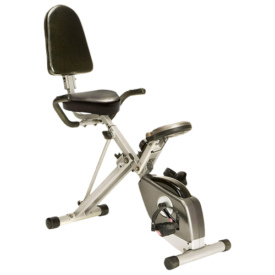
This recumbent bike is lightweight at only 43 pounds while still being sturdy enough to support most users. It folds up to store away easily and can be used under a desk or as a regular recumbent bike with eight levels of manually selected resistance.
Specs
- Price: $200
- Dimensions: 46″ H x 33″ L x 19″ W
- Weight: 43 lbs
- Resistance: 8 levels magnetic resistance
- Weight Capacity: 300lbs
Pros
- Its recumbent design provides seniors with a comfortable ride and is ideal for low-intensity exercise.
- At just 43 pounds, it can be folded and stored quickly.
- For $200, the 8 levels of magnetic resistance and foldability make it a good value.
Cons
- Seniors looking for more of a challenging ride may want more than the 8 levels of resistance.
- The low placement of the LCD display may make it difficult to read your metrics.
By virtue of their backrest, recumbent bikes offer a low-intensity alternative to the typical upright exercise bike, making them a good option for anyone looking for less strenuous exercise. Enter the Exerpeutic 400XL Folding Recumbent Bike, our pick for the best portable exercise bike for seniors. With its folding capability and 43-pound overall weight, it earned ratings of 5 out of 5 in four categories — including footprint, portability, and durability — from our expert tester, certified personal trainer Kate Meier.
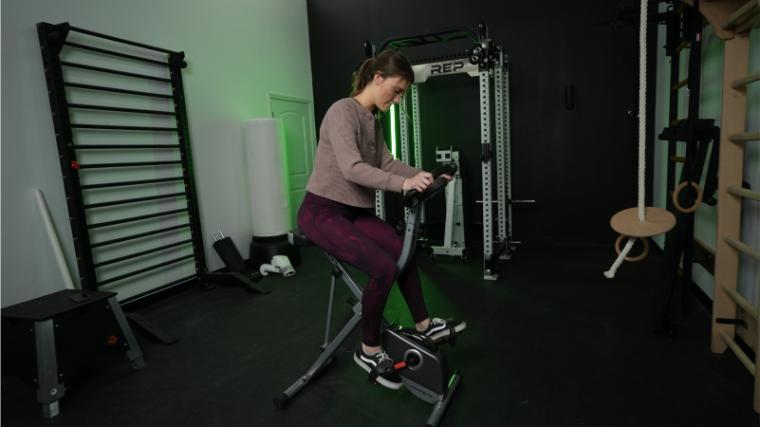
After folding it up, Meier noted how easily she could move it. “In the folded position, it’s only about 17 inches wide, so it felt like rolling around a little suitcase,” she said. Even with a footprint about as small as a dining room chair, its steel frame can support users up to 300 pounds, making it more accessible for heavier users. (1)
[Related: Best Recumbent Bikes]
Adjustability, ergonomics, and customizations all earned ratings of 3.5 out of 5 from Meier, and she highlighted how comfortable it was to use. “The padded seat was large, very cushioned, and I’m 5 foot 4 inches, so being able to adjust it up and down allowed me to find just the right height,” she said. The 8 levels of magnetic resistance were also easy to change and, while that’s fewer levels than the other portable exercise bikes we tested — they tend to range from 16 all the way up to 100 — they should be more than enough for most seniors to get their heart rate up.
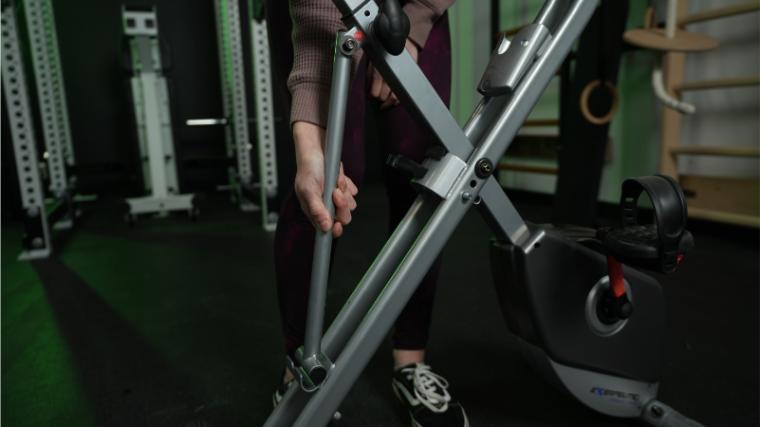
Another area that received a perfect 5-out-of-5 rating from Meier was its value. At $200, it’s around $400 less than other budget-friendly recumbent bikes we’ve tested. “It’s just a no-nonsense, low-frills option that gets the job done,” Meier said. You won’t find the tech capabilities — a 3.5 out of 5 from Meier — of recumbent bikes that push $1,500, but it does feature an LCD monitor that shows your time, distance, and speed.
What to Consider Before Buying a Portable Exercise Bike
Before you decide to saddle up on your own portable exercise bike, there are a few factors that may determine how you find your best match. Take into account where exactly you’ll use it in your home gym or living space, how often you’ll need to move it, and the type of bike that suits your fitness goals.
Mobility
When we lay out our lists, we include the dimensions of each bike so that you can physically measure the space where you plan on using it. There’s nothing quite as disappointing as assembling your bike, squeezing into your shorts, and not being able to fit it in your gym because you didn’t measure the space. Grab a tape measure, write down the dimensions, and ensure your bike will fit where you need it.
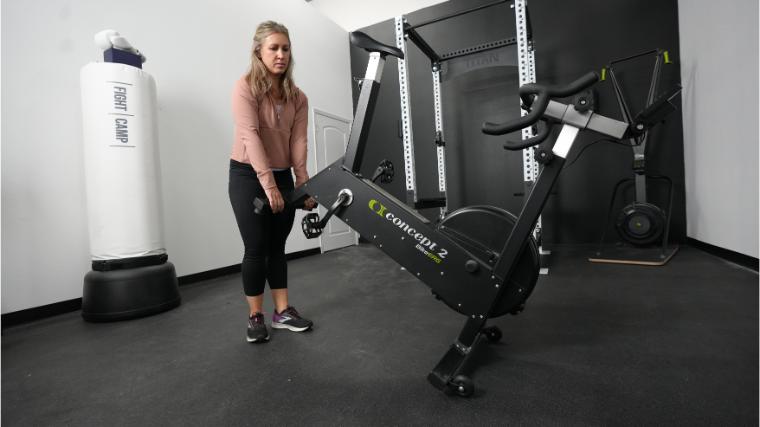
After you visualize where you’ll be pumping the pedals, maybe even map out how you’ll be moving it around. If you’re looking for a portable exercise bike, you may need to move it from room to room or in and out of storage. Before making your big purchase, double check you can relocate your bike as needed.
Durability
Whether you need a foldable exercise bike or just one that is light enough to move around frequently, consider the durability of the frame and key parts. Stability can be an issue with some foldable and portable options, as they require a less rigid design. There are portable options that don’t fold, so if you have enough floor space and are concerned about durability, consider a non-folding option for more stability.
Type of Exercise Bike
If you are debating the merits of recumbent bikes vs. upright bikes, first establish your fitness goals and training regimen. If you know it will be a while before you are back to 100 percent following an injury, the lower intensity of a recumbent bike could make sense for you. (2) If you’re thinking about trying out for USA Cycling, the intense workouts an upright bike can provide probably make it your best bet. In a vertical position, you’ll engage your core to support your bodyweight, as opposed to leaning back in a recumbent bike seat.
Benefits of the Best Portable Exercise Bikes
Exercise bikes designed with mobility in mind can help you save some real estate in a smaller home gym or living space, while still providing the cardiovascular benefits — lower blood pressure, reduced risk of heart disease — of larger, heavier bikes. (3) Here are a few of the benefits of cycling with a portable exercise bike.
Easy to Move
If you’re getting more of a workout just moving furniture to make room for your cardio machine, it might be time to explore the lighter, foldable, and more mobile options out there. These bikes are designed to be folded, wheeled, and stashed away so you can reclaim some of your floor space — and sanity.
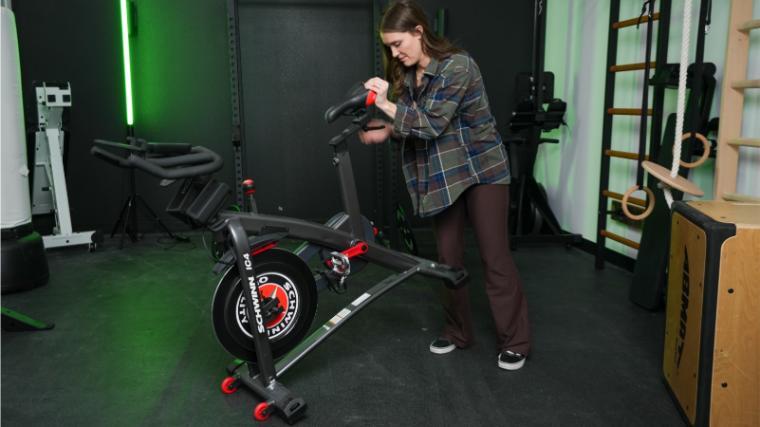
Compared to the average exercise bike, these portable options tend to have lighter overall weights, occupy less square footage, and can be tilted and rolled out of sight.
Convenience
Having your own versatile piece of home fitness equipment at the ready is convenient, but also removes a big obstacle to sticking to a consistent training regimen. Even among the cardio machines, exercise bikes may be a great entry point for some people as they typically require less space — and cash — than treadmills, ellipticals, or rowing machines.
[Related: The 9 Best Tried and Tested Treadmill Alternatives]
Our expert reviewer and certified personal trainer Amanda Capritto spelled it out when she assessed the best exercise bikes for BarBend. “Indoor exercise bikes provide access to cycling no matter the weather or outdoor conditions. Many people do not feel safe cycling outside. An exercise bike eliminates traffic as a reason to skip your session, so it can be someone’s golden ticket to exercising more frequently. “
Low-Impact Cardio
Anyone trying to train with joint issues or chronic back problems could testify — preach! — that the impact absorbed during forms of cardio like running can be painful. (4) Even worse, it can be a deterrent to exercising at all. Saddling up on an exercise bike can still offer the cardiovascular benefits of other types of training — lower blood pressure, reduced risk of heart disease — as well as improved flexibility, reduced stress, and even improved mood. (3)(5)
How Much Do the Best Portable Exercise Bikes Cost?
While exercise bikes can range from a few hundred dollars to several thousand, most people may be best served by the machines toward the middle of that range. How you use your bike, how much space you can devote to it, and the amount of technology features onboard are three of the main factors that can determine the price of an exercise bike. Here is a breakdown of the cost of the best portable exercise bikes on our list.
| Best Overall Portable Exercise Bike | NordicTrack S22i | $1,999 |
| Best Lightweight Portable Exercise Bike | Concept2 BikeErg | $1,467 |
| Best Budget Portable Exercise Bike | ProForm Carbon CX | $399 |
| Best Adjustable Portable Exercise Bike | Schwinn IC4 | $999 |
| Best Foldable Portable Exercise Bike | Marcy Foldable Upright Exercise Bike | $189 |
| Best Compact Portable Exercise Bike | Yosuda Indoor Cycling Bike | $279 |
| Best Portable Exercise Bike for Small Spaces | Sharper Image Space Saving Stationary Bike | $349 |
| Best Portable Mini Exercise Bike | DeskCycle 2 | $199 |
| Best Portable Exercise Bike for Seniors | Exerpeutic 400XL Folding Recumbent Bike | $200 |
While all of these bikes are portable, some could be considered more portable than others by virtue of their weight, design, or type. A mini exercise bike that weighs 23 pounds will naturally cost less than a studio-quality bike with a 22-inch HD touchscreen.
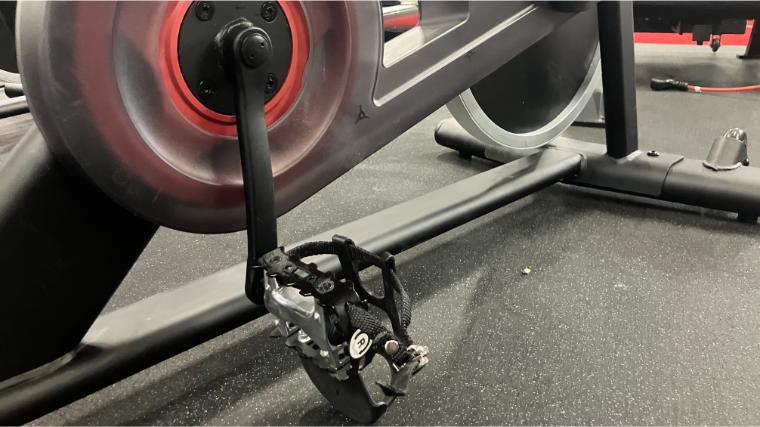
Options closer to $189 may be just the kind of simple machine you’re looking for — no frills, just something to pedal while you watch TV. At the other end of the range, you can expect sturdier builds and more tech features that can mimic outdoor cycling or sweat-drenched studio classes.
Types of Exercise Bikes
If you’re lost trying to figure out what to look for when buying an indoor cycle, the first step is deciding what type of bike fits your needs. Amanda Capritto, our expert reviewer and certified personal trainer, explained who may benefit most from each type of bike.
“Recumbent bikes allow people with mobility limitations or injuries to enjoy cycling, as they are reclined and take pressure off of the hips and back. Upright bikes are your typical stationary bikes, which are excellent for high-intensity exercise and tech-savvy cyclists who love to take fitness classes.”
Upright
This kind of bike is what most people picture when thinking of indoor exercise bikes. They’re meant to mimic a road bike in both experience and aesthetics, so you can either pedal while sitting or rise up to a standing position, and the seats and handlebars are typically adjustable to help accommodate various body types. Most upright bikes use a weighted disc — called a flywheel — to provide different levels of adjustable resistance.
Recumbent Exercise Bike
Imagine an upright exercise bike, then lean back and you’ve got a recumbent bike. These bikes have larger, more comfortable seats with back support and, while your legs and glutes still get some good work in, it generally provides a less strenuous workout than upright or air bikes. Recumbent bikes are great for those in recovery following an injury or for anyone struggling with achy joints. (2)
Air Bike
What distinguishes air bikes from upright or recumbent exercise bikes is what provides the resistance. You guessed it — air. Most air bikes also have large, movable arms which, along with the pedals, power the fan. While some air bikes rely only on the pedals to power the fan, models with moving arms offer an upper-body burn in addition to a lower-body one.
Final Word
Trying to find the space for an exercise bike, treadmill, or other home gym essential can be a tall task if you’re short on space. Rolling or carrying away one of the bikes in our list will let you reclaim some precious floor space while still pursuing your fitness goals. With small footprints, transport wheels, and adjustable seats and handlebars, these bikes can help you reap the benefits of cardiovascular exercise, like reduced risk of heart disease, and then disappear until you need them again. (3)(6)
Whether you’re after a studio-like experience or just need to pedal at your desk during work, an exercise bike doesn’t have to be a fixture in your living room. Take advantage of the time we spent riding, folding, and moving these bikes to find the best portable exercise bike to get your heart pumping.
FAQs
What is the best portable exercise bike?
We go back and forth when it comes to the Peloton vs. NordicTrack debate, but our choice for the best overall exercise bike is the NordicTrack S22i. It is loaded with premium features — 22-inch HD touchscreen, iFIT integration, and 24 of magnetic resistance settings — while being mobile enough to roll out of your way when you need it to.
Are foldable exercise bikes worth it?
An exercise bike that can fold upright is often the easiest way to save space while still taking advantage of the cardiovascular benefits of riding. (3)(6) At roughly $200, these options are generally less expensive than non-folding bikes — roughly $600 to $2,000 — but you’ll have to compromise a bit on durability. However, for such a low price point, we think they bring good value.
What is the best foldable stationary bike?
The Marcy Foldable Upright Exercise Bike is our pick for the best foldable option for most people. For just $189, you get 8 levels of magnetic resistance and an ultra-light 37-pound frame that can be rolled away when you finish your at-home workout.
References
- Newman, K., Gibson, K., Zeller, H., Carter, S., and Joyce, B. (July 7, 2009). “Recumbent Exercise Bicycle for Low-Impact Rehabilitation of Obese Individuals.” ASME. J. Med. Devices. June 2009; 3(2): 027516.
- McLeod, W. D., & Blackburn, T. A. (1980). Biomechanics of knee rehabilitation with cycling. The American journal of sports medicine, 8(3), 175–180.
- Chavarrias, M., Carlos-Vivas, J., Collado-Mateo, D., & Pérez-Gómez, J. (2019). Health Benefits of Indoor Cycling: A Systematic Review. Medicina (Kaunas, Lithuania), 55(8), 452.
- Dong, X., Li, C., Liu, J., Huang, P., Jiang, G., Zhang, M., Zhang, W., & Zhang, X. (2021). The effect of running on knee joint cartilage: A systematic review and meta-analysis. Physical therapy in sport : official journal of the Association of Chartered Physiotherapists in Sports Medicine, 47, 147–155.
- Sandmeier R. H. (2000). Osteoarthritis and Exercise: Does Increased Activity Wear Out Joints?. The Permanente Journal, 4(4), 26–28.
- Mersy D. J. (1991). Health benefits of aerobic exercise. Postgraduate medicine, 90(1), 103–112.